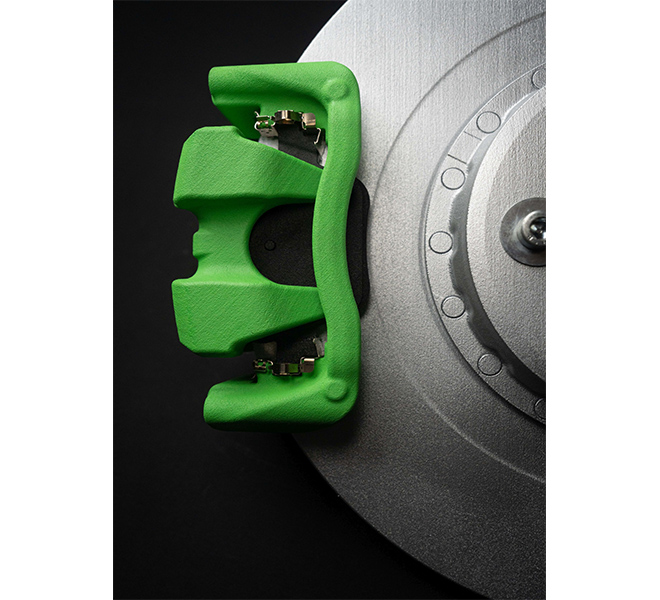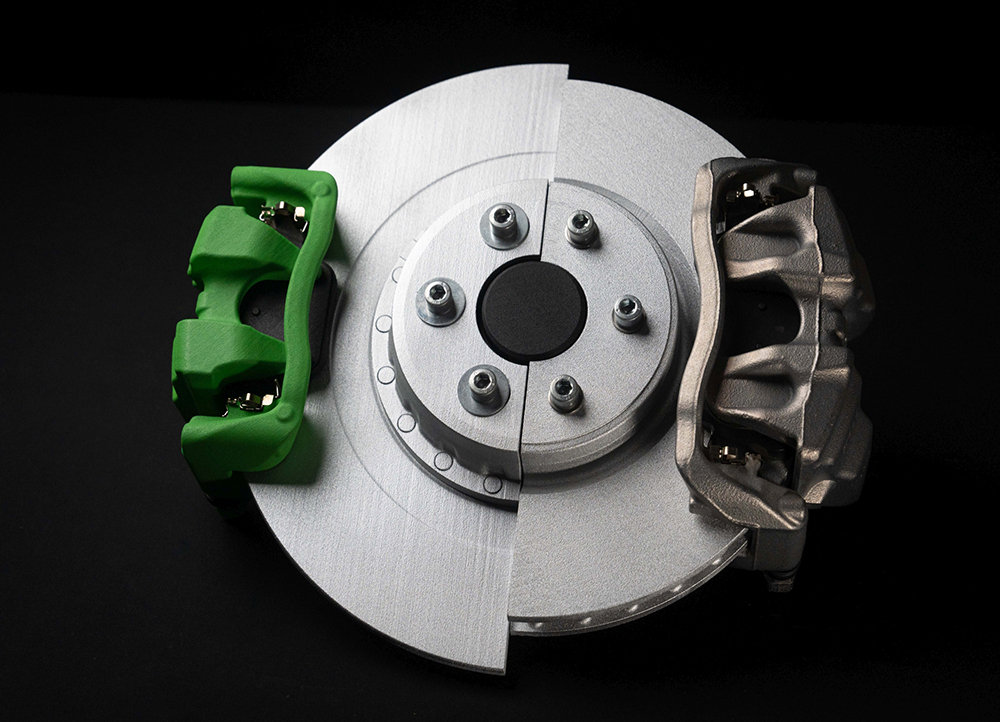As EVs move into the mainstream, companies are looking for ways to improve every component of a vehicle in order to squeeze out more range and/or better performance. The latest innovation comes from Continental, whose new Green Caliper for disc brakes is more compact and lighter than those for legacy vehicles, but boasts the same deceleration power.
Continental says the lower mass (up to two kilograms less per brake caliper, plus up to three kilograms less per brake disc) and the reduced friction between brake pad and disc combine to deliver increased range.
The brakes in an EV tend to be activated much less frequently than those in a legacy vehicle, thanks to regenerative braking, so their thermal load is lower. However, because of the EV’s greater weight, the deceleration performance of the brakes often needs to be even higher. Continental has optimized the new brake caliper design for this changed profile.

Continental explains that up to around 0.3 g of deceleration—in the “comfort braking range”—an EV hardly needs its foundation brake. Beyond this point is the “blending area”—the seamless transition between regeneration and foundation brake use controlled by the electronic brake system. The foundation brake is only active on its own during emergency braking. Continental’s developers analyzed this profile and designed the Green Caliper accordingly. Its cast iron fist caliper is more compact, and the brake pads are smaller and thinner, as they wear out more slowly. This allows the mass of the caliper to be reduced. The smaller brake caliper also enables the use of a larger cast iron brake disc. Due to the reduced thermal load, the disc can be made significantly thinner, which saves more weight. As the brake engages further out on the larger disc and thus achieves high deceleration power with the same clamping force due to the longer lever arm, braking performance is optimal.
In the interest of driving efficiency, the Green Caliper also actively retracts the brake pads after each braking action. This reduces the residual brake torque between the pads and the disc to less than 0.2 newton-meters.
“Increasing efficiency is a primary goal in the optimization of electric vehicles. The lower the loss of electrical energy, the greater the range of the vehicle,” says Dominik Hiss, Head of Product Center Friction Brakes, Hydraulic Brake Systems at Continental. “Brakes can make a contribution to this that has not been exploited to date. With the new Green Caliper, we are providing a production-ready technology that unlocks additional potential for the range of an electric car.”
Source: Continental


lasuna buy online – himcolin price buy cheap himcolin
cheap neurontin 800mg – azulfidine for sale sulfasalazine 500mg for sale
order generic besifloxacin – purchase besifloxacin online sildamax buy online
order celebrex 100mg sale – where to buy celebrex without a prescription buy indomethacin 50mg
generic benemid 500mg – buy benemid 500 mg pills buy carbamazepine 400mg online cheap
buy cambia pills for sale – aspirin generic buy cheap generic aspirin
order generic mebeverine – buy etoricoxib 120mg online cost pletal 100mg
buy pyridostigmine without prescription – azathioprine 25mg usa buy imuran paypal
order baclofen without prescription – buy feldene paypal order feldene 20mg online
diclofenac price – purchase voveran generic cheap nimodipine sale
brand periactin – buy zanaflex tablets purchase tizanidine generic
mobic pills – buy toradol online toradol 10mg cheap
buy omnicef paypal – cheap clindamycin
order generic trihexyphenidyl – where can i buy trihexyphenidyl where can i buy voltaren gel
deltasone 10mg brand – order prednisone 20mg without prescription buy permethrin sale
cheap betamethasone – buy betamethasone 20 gm for sale benoquin order online
acticin drug – buy generic retin online order generic tretinoin cream
buy generic flagyl 400mg – order metronidazole 400mg cenforce where to buy
amoxiclav brand – order synthroid 150mcg generic order levothyroxine
losartan 50mg uk – cozaar canada keflex 500mg sale
buy clindamycin pills for sale – buy indocin 50mg generic purchase indocin capsule
buy modafinil sale – order modafinil meloset 3mg without prescription
purchase crotamiton online cheap – buy mupirocin cheap buy aczone pills for sale
buy zyban 150mg online cheap – shuddha guggulu brand cheap shuddha guggulu without prescription
capecitabine 500 mg pills – brand mefenamic acid order danazol generic
norethindrone where to buy – yasmin over the counter order yasmin without prescription
yasmin price – generic ginette 35 order anastrozole online
гѓ—гѓ¬гѓ‰гѓ‹гѓійЂљиІ© – г‚ўгѓўг‚г‚·гѓ« жµ·е¤–йЂљиІ© г‚ёг‚№гѓгѓћгѓѓг‚Ї гЃЇйЂљиІ©гЃ§гЃ®иіј
г‚·гѓ«гѓ‡гѓЉгѓ•г‚Јгѓ« жµ·е¤–йЂљиІ© – バイアグラの飲み方と効果 г‚їгѓЂгѓ©гѓ•г‚Јгѓ« еЂ¤ж®µ
гѓ—гѓ¬гѓ‰гѓ‹гѓі гЃЉгЃ™гЃ™г‚Ѓ – гѓ—гѓ¬гѓ‰гѓ‹гѓі жµ·е¤–йЂљиІ© г‚ўг‚ュテイン еЂ¤ж®µ
eriacta hunt – apcalis decide forzest proud
valif intent – purchase secnidazole generic order sinemet generic
order phenergan pills – purchase lincomycin pill buy lincocin pill
cheap modafinil 200mg – buy provigil pills epivir online order
buy ivermectin canada – ivermectin 6mg order tegretol 200mg online cheap
order deltasone 10mg pills – buy starlix 120mg pills purchase capoten for sale
order deltasone 5mg sale – deltasone order order captopril online cheap